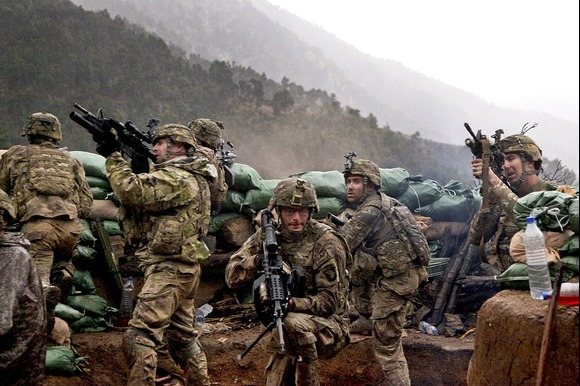Intense fighting erupted near Pakistan’s border with Afghanistan this week, leaving dozens of people dead, including several Pakistani soldiers and insurgents. The clashes mark one of the deadliest confrontations in recent months as Pakistan intensifies operations to eliminate militant hideouts in the country’s volatile northwest region.
According to Pakistan’s military, at least 11 soldiers and 19 militants were killed during a fierce gun battle in Orakzai district of Khyber Pakhtunkhwa province, an area long known for cross-border militant activity. The Tehrik-e-Taliban Pakistan (TTP), a banned militant organization, claimed responsibility for the attack.
The Orakzai Operation: A Vicious Exchange of Fire
The deadly encounter began in the early hours of Thursday morning when security forces launched a raid on a suspected TTP hideout in the mountainous Orakzai district. The militants retaliated with heavy gunfire, sparking an intense firefight that lasted several hours.
Among the casualties were Lieutenant Colonel Junaid Arif and Major Tayyab Rahat, two senior officers who were leading the operation. Both were praised by the Inter-Services Public Relations (ISPR) for their bravery and leadership during what the military described as a “fierce and valiant engagement.”
“Security forces effectively engaged the terrorist hideout, killing 19 terrorists and recovering a cache of weapons and explosives,” the ISPR said in a statement. “The nation pays tribute to its heroes who continue to sacrifice their lives for the country’s peace and security.”
Military Launches Expanded Counter-Militancy Campaign
The Orakzai operation was part of a broader campaign spanning multiple districts, including Bajaur, South Waziristan, and Lower Dir. These regions have seen a resurgence in militant activity in recent months, prompting Pakistan’s army to conduct intelligence-based raids (IBOs) aimed at dismantling terror networks and disrupting infiltration routes.
In these coordinated operations, at least 19 Pakistani soldiers and 45 militants were reported killed. Military officials said several militant compounds and ammunition depots were destroyed.
Authorities believe many of the fighters are using Afghan territory as safe havens, conducting cross-border attacks before retreating into Afghanistan. Islamabad has repeatedly urged Kabul’s Taliban-led government to prevent such movements, but cooperation remains limited.
Growing Regional Tensions and Security Concerns
The fighting underscores Pakistan’s growing frustration with deteriorating border security. The rugged frontier, which runs for more than 2,600 kilometers, has long been a hotbed of insurgent activity and smuggling.
Since the Taliban’s takeover of Afghanistan in 2021, Pakistan has seen a sharp increase in TTP attacks on its soil. While the Afghan Taliban denies providing direct support to the group, Pakistani officials insist that the militants operate from sanctuaries across the border.
“Pakistan has repeatedly raised its concerns with Afghan authorities regarding the presence of terrorist elements operating freely on their soil,” the Foreign Office said in a recent statement. “Such activities pose a serious threat to regional peace and stability.”
Civilian Impact and Local Reactions
In Orakzai and nearby areas, residents reported hearing heavy gunfire and explosions throughout the night. Local villagers fled their homes amid fears of continued fighting. Medical teams and rescue workers were dispatched to the region, while local hospitals treated dozens of wounded.
A resident from the nearby town of Kalaya told local media:
“We could hear the sound of gunfire echoing from the mountains. People were terrified and started moving to safer areas before dawn.”
Authorities have since imposed additional security measures, including checkpoints and curfews, in parts of Khyber Pakhtunkhwa to prevent further militant movement.
Pakistan’s Long Battle with Militancy
Pakistan has been battling militancy for over two decades, primarily along its western frontier. The military has launched several large-scale operations — including Zarb-e-Azb, Radd-ul-Fasaad, and Khyber-IV — to root out extremist groups from tribal areas bordering Afghanistan.
While these campaigns have weakened organized militant networks, recent attacks suggest that remnants of the TTP and other extremist factions are regrouping. Analysts say the group has benefited from instability in Afghanistan and shifting regional dynamics.
Security analyst Ayesha Siddiqa noted:
“The TTP’s growing confidence and cross-border mobility highlight the need for stronger regional intelligence cooperation. Without Afghanistan’s active involvement, Pakistan faces a prolonged security challenge.”
Government Condemnation and National Mourning
Prime Minister Shehbaz Sharif expressed deep grief over the loss of soldiers and reaffirmed the government’s commitment to eradicating terrorism.
“These brave sons of the soil sacrificed their lives for our homeland,” he said in a statement. “The entire nation stands united behind its armed forces in the fight against terrorism.”
The military held funeral prayers for the slain officers with full honors. Flags were lowered across military installations in their memory.
Outlook: An Escalating Cross-Border Challenge
The renewed violence highlights the fragility of peace in Pakistan’s northwest. As militant attacks rise, Islamabad faces the challenge of balancing domestic security with strained ties with Kabul.
Observers warn that unless cross-border militancy is curbed, Pakistan’s counterterrorism efforts may continue to face major setbacks. The coming months are expected to see heightened operations as security forces push to neutralize insurgent strongholds and restore stability in the frontier regions.






